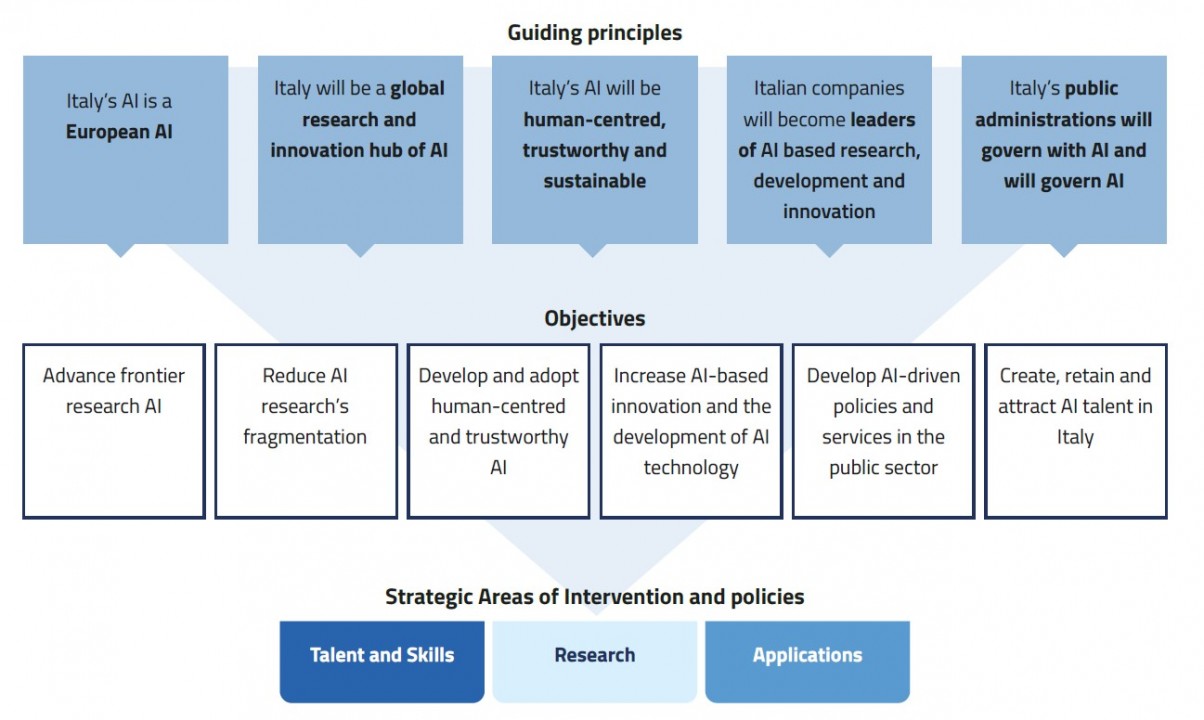

Italian AI ecosystem has a vast, but not fully exploited yet, potential: that's why Italy now launches a radical upgrade of its national AI strategy
Autore: By InnovationOpenLab

Artificial Intelligence will be more and more a central factor in the Digital Transformation of private companies, Public Sector an society as a whole. In this context, however, Italy lags behind not only the "AI superpowers" like United States and China, but also other peer European countries, like France or Germany. Italian AI strategy needs a boost, and this is exactly what the new Strategic Program on Artificial Intelligence 2022-2024 is designed for.
Italian AI scenario is not - says the Government - that bad. The Italian AI ecosystem shows vast potential, with vibrant research communities and a rapid growth in AI solutions offering. But it often lacks scale, and the economic contribution of AI market still remains below the average of other EU countries. Things can and must change. With a composite strategy that counts on three main areas of intervention: strengthening and attracting talents and competences in AI, expanding advanced research funding in AI, favouring AI adoption in public and private sectors.
These three generic goals can be achieved with a mix of 24 specific initiatives that all aims to close the gap between Italy and other, more AI-savvy, countries. A gap that is (painfully) better described with a few key indicators. Like the persistent issue of scale, critical mass and interdisciplinary integration of AI research labs. Or that few foreign talents come to work in Italy, and the country yields far less patents per paper than EU peers. Moreover, Italy invests 1.45% of GDP in research while on average EU countries invest 2.38% of GDP. And Italian companies spend €14.7 billion in R&D per annum (2018), less than average EU peers.
Given these challenges, and Italy’s competitive position in AI field, the Strategic Program on Artificial Intelligence 2022-2024 defines a few generic but crucial objectives: advance research in AI and reduce its fragmentation, increase AI-based innovation and the development and adoption of AI technology, develop AI-driven services in the public sector, create and attract AI talent. These goals are especially related to eleven "priority sectors": areas where Italy already has a competitive advantage, such as manufacturing, or that are strategic to the country’s technological development, such as national security.
Italy needs to invest holistically in AI training and skills development, but also in being at the forefront of AI research. This will be done with five specific policies: strengthening the National PhD Program, attracting and retaining talents, strengthening AI skills in the Public Sector, promoting STEM courses and careers, promoting AI in vocational secondary school (ITS, Istituti Tecnici Superiori). The initiatives will be funded mainly via the PNRR Recovery Plan, with a potential funding of 6.5 billion euros.
To bridge the gap between basic and applied research - fostering collaborations between academia, industry, governmental agencies and society - the new Strategic Program describes a sinergy of eight actions. For all these actions there is a potential funding of 7.9 billion euros.
Of course, promoting research in AI is almost useless if there are just a few market opportunities for AI applications and technologies. To address these challenges, the Strategic Program proposes a set of policies aimed at expanding AI uses in private companies and public entities.
In the private sector, AI should become one of the technological platforms supporting the so-called "Transition 4.0" projects. That means supporting Italian companies in developing and adopting AI applications. But also funding new startups and spinoffs working on AI technologies. PNRR already allocated more that 13 billion euros for Transizione 4.0, spinoffs and startups can access a special fund (Fondo Nazionale Innovazione) of one billion euros created by Ministero dello Sviluppo Economico.
And the Public Sector? It could be "a real driver of AI development, thanks to the data it produces and to its role as a more potential purchaser of innovative goods or services", the Strategic Program says. But government agencies must work on data interoperability and open access, and in general must facilitate the development of AI solutions for the many different aspects of Public Administration. The Strategic Program does not allocate specific funding for Public Sector activities in AI: money must come from different Ministries.